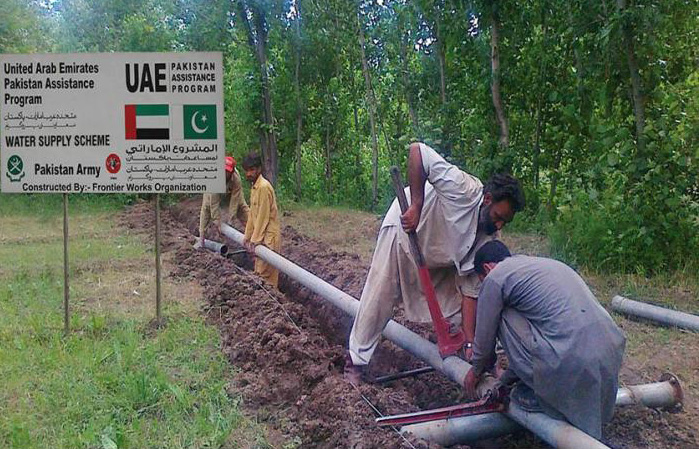ID :
333700
Sun, 06/29/2014 - 09:10
Auther :
Shortlink :
https://oananews.org//node/333700
The shortlink copeid
U.A.E. implements 76 clean water projects across Pakistan

In line with the directives of President His Highness Sheikh Khalifa bin Zayed Al Nahyan, the U.A.E. Pakistan Assistance Programme, U.A.E. PAP, has so far implemented more than 70 projects at a cost of more than US$6.9 million to bring clean drinking water to people across Pakistan's provinces.
U.A.E PAP said US$6,973000 were spent on 76 water projects which include digging wells, building water desalination plants, tanks and pumps and building water supply systems for tens of thousands of households in Khyber Pakhtunkhwa and Waziristan where locals had to travel away from their houses to get clean water.
These include 44 projects in Khyber Pakhtunkhwa, 20 in South Waziristan, in the first phase, and 12 others in Mohmand Agency and two in North Waziristan in the second phase of the U.A.E. PAP's water assistance plan for Pakistan.
The U.A.E. PAP was launched in line with the directives of President His Highness Shaikh Khalifa Bin Zayed Al Nahyan on 12 January 2011 to help Pakistan overcome the consequences of the 2010 destructive torrential rains and floods through infrastructure rehabilitation, humanitarian aid and reconstruction in the affected areas.
U.A.E. PAP developed a plan to achieve its goals and overcome rugged geography and harsh weather conditions in the targeted areas. The plan has four main pivots for infrastructure and community development: roads and bridges, education, health and safe water supply. It also provides for additional efforts to provide humanitarian assistance for the unprivileged, poor and homeless.
The U.A.E. PAP showcases the success of U.A.E.'s humanitarian and development efforts to assist the people of Pakistan.
With water pollution and shortages, in remote areas in particular, causing serious public health problems for the population, U.A.E. PAP cites malaria and hepatitis as two major public health concerns that it addresses through safe water projects in the Pakistani targeted provinces.
U.A.E. was among the founders of the Friends of Democratic Pakistan (FoDP) which was launched in 2008 to extend support to Pakistan's social and economic development. Other founding member states include Britain, France, Germany, the United States, China, the United Arab Emirates, Canada, Turkey, Australia and Italy plus the United Nations and the European Union.
On 16 August 2010, the UN estimated that up to 3.5 million children are at high risk from deadly water-borne diseases in Pakistan as a result of the country's devastating floods.
Maurizio Giuliano, a spokesman for the UN Office for the Co-ordination of Humanitarian Affairs, OCHA, said, "up to 3.5 million Pakistani children are at high risk of deadly waterborne diseases, such as watery diarrhoea and dysentery. Water during the flood has been contaminated badly. There is a shortage of clean water." "What concerns us the most is water and health. Clean water is essential to prevent deadly water-borne diseases. Water during the flood has been contaminated badly." The World Health Organisation (WHO) was also preparing to assist tens of thousands of people in case of cholera, although the government has not notified the UN of any confirmed cases, he added estimating the number at risk from such diseases was six million.
In a report released in February 2007, the World Wide Fund for Nature (WWF) said 20-40 percent of "people in hospitals in Pakistan are suffering from water-borne diseases - gastroenteritis, typhoid, cholera, dysentery and other serious diseases". The report said every third Pakistani "drinks unsafe water".
The World Bank, based on estimates developed by the UN Inter-agency Group for Child Mortality Estimation (UNICEF, WHO, World Bank, UN DESA Population Division), says under-five mortality rate is the probability per 1,000 that a new-born baby will die before reaching age five, if subject to current age-specific mortality rates.
According to a report released by United Nations Children s Fund (UNICEF) in 2012, pneumonia and diarrhoea are leading killers of the world’s youngest children, accounting for 29 per cent of deaths among children under age 5 worldwide or more than 2 million lives lost each year. – Emirates News Agency, WAM





